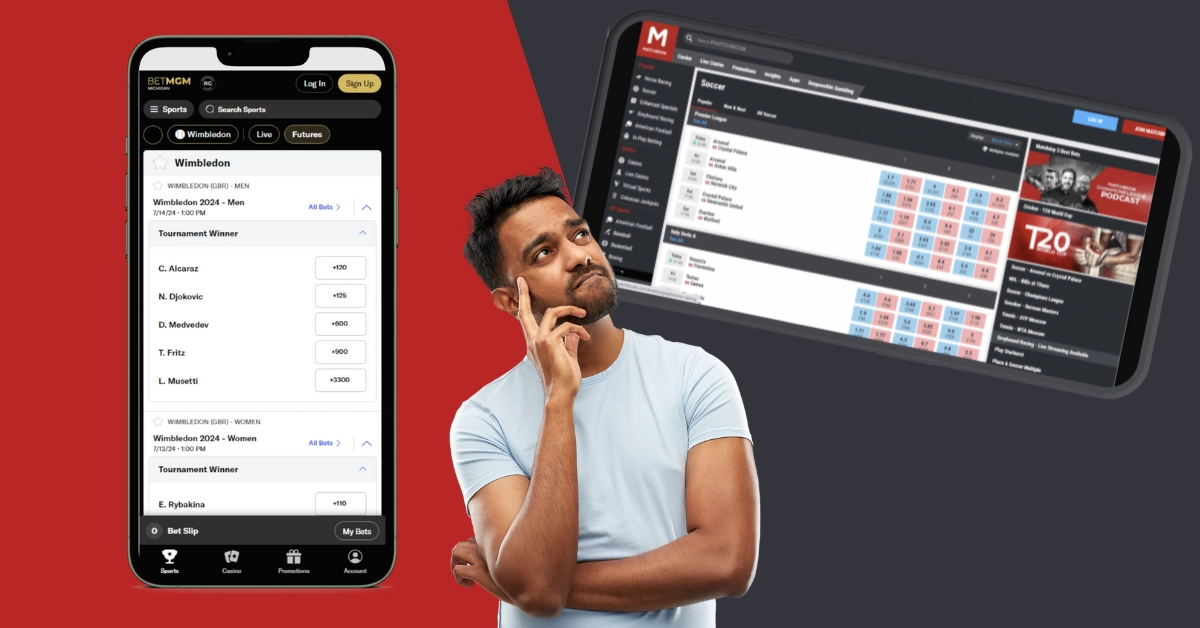Betting Exchanges vs. Traditional Bookmakers: Which Offers Better Value?

If you’re a betting person, you’ve probably done it through a traditional bookmaker—it’s sort of a knee-jerk reaction. You know how it works: you bet against the house, cross your fingers and toes, and hope the odds will work in your favor. But what if we told you there’s another way to do it? There is! Betting exchanges have been getting some decent traction. Instead of you betting against the house, you’re betting against other people.
Besides who you’re betting against, what’s the difference? And which one offers better value? Let’s find out and talk odds, fees, and the types of bets you can place—basically, everything you need to know to figure out where you’ll get the most bang for your buck. If you want to find out which option is going to give you an edge, keep scrolling to find out!
What Are Traditional Bookmakers?
Traditional bookmakers (aka bookies) are the OG betting outlets where people place their bets on all kinds of sports and events. Back in the olden days (a decade ago, lol), you used to have to go to a physical betting shop, but now there are betting apps! Whichever method you prefer, traditional bookies are basically the middleman between you and your potential winnings. They set the odds based on the probability of outcomes, take your money if you lose, and payout if you win.

How Do They Make Money?
Traditional bookmakers make their money by always tilting the odds slightly in their favor, a concept known as the “house edge” or “overround.” The margin, no matter how small, guarantees that over time, the bookmaker will profit no matter the event’s outcome. They could set the total probability of all possible football match outcomes to over 100%, so they always get a piece of the action. And bookmakers usually tweak their odds to attract bets on both sides of a market, which decreases their overall risk.
Some of the most popular traditional bookmakers include the following:
- Bet365: One of the largest online betting apps globally, offering a huge variety of sports and events.
- William Hill: A historic name in UK betting, with both physical shops and a strong online presence.
- Ladbrokes: Another major player in both brick-and-mortar and online betting, known for its variety of betting options.
- Coral: A well-known bookmaker that has expanded its offerings through digital platforms
- Paddy Power: Known for its humorous advertising and extensive range of markets, Paddy Power has a strong online and retail presence, especially in the UK and Ireland.
- Betfred: A UK-based bookmaker with a solid online platform and an extensive chain of physical betting shops.
- Unibet: Part of the Kindred Group, Unibet offers sports betting, online casino games, and more, with a focus on European markets.
- Sky Bet: Backed by Sky Sports, this bookmaker offers a wide variety of betting markets, particularly on football and other major sports.
- 888sport: Known for offering competitive odds and a wide range of betting options, 888sport is part of the larger 888 Holdings group, which operates across many gaming verticals.
- BoyleSports: Ireland’s largest independent bookmaker, with a growing presence online and in physical shops.
The bookmakers we listed are all licensed and reputable, and they are popular choices for casual and serious bettors!
What Are Betting Exchanges?
Betting exchanges are like the cooler, more chill cousin of traditional bookmakers. Instead of betting against the house, you bet against other people, and the exchange is just hanging back and facilitating the action. It’s much more flexible, usually cheaper, and can give you better odds because it cuts out the middleman.

How are Betting Exchanges Different Than Traditional Bookmakers?
With traditional bookmakers, you’re always betting against the house—they set the odds, and you either take them or leave them. Betting exchanges flip this idea on its head. On an exchange, users bet directly against each other, and the exchange just connects you. You can either back a result (betting that something will happen) or lay a result (betting that something won’t happen). The platform makes money by taking a small commission on winning bets.
How Do Betting Exchanges Work?
In the simplest terms, a betting exchange works by matching up bettors who think differently. If you think Team A is going to win, and someone else is convinced they’re going to lose, the exchange steps in, matches your bets and takes a cut from the winner. The best thing about it is that you can also lay bets—meaning you can act like the bookie and bet that something won’t happen.
The odds are usually better here compared to traditional bookies because they’re all set by the users and not by a company that is trying to protect its profits. But the amount you can bet does depend on the exchange’s liquidity, which is basically the amount of money that is available for betting at any given time.
Some of the most well-known betting exchanges include the following:
- Betfair: The largest and most popular betting exchange in the world, known for offering a wide range of sports and events, along with competitive odds and high liquidity.
- Smarkets: Known for low commission rates and a user-friendly interface, Smarkets has quickly become a popular choice.
- Betdaq: While not as big as Betfair, Betdaq remains a solid option for those who are looking for a reputable exchange, and it has a loyal user base.
- Matchbook: Known for its low commissions and a focus on high liquidity in popular markets like football and horse racing.
- Profit Exchange: A new-ish player, but it is gaining attention for offering zero commission on matched bets for early adopters in the US.
The exchanges above have different features, but they all revolve around the core idea of giving bettors more control over their odds and a peer-to-peer betting experience.
Main Differences Between Betting Exchanges and Traditional Bookmakers
There are six main differences between betting exchanges and standard bookmakers. It’s comparable to the difference between shopping at a farmer’s market versus a grocery store. At an open market, you can haggle with individual sellers for the best deal, but at the grocery store, the prices are set, and you have just to take them as they are.
Check out the table below for a side-by-side comparison to show what each one brings to the betting arena!
| Aspect | Betting Exchange | Traditional Bookmaker |
|---|---|---|
Odds | User-driven, usually better value | Set by the bookmaker, usually lower |
Fees/Commission | Small commission on winning bets | Built into the odds (house edge) |
Bet Types | Back and lay bets (bet for or against) | Only back bets (bet for) |
Flexibility | Users can set or choose odds, more control | Limited to the odds offered by the bookmaker |
Limits | No limits for successful bettors | Bookmakers may limit high winners |
In-Play Betting | Yes, usually with real-time adjustments | Yes, but the odds change slower |
As you can see, there are obvious variations, and we explain each one below:
- Odds: Betting exchanges usually provide better odds because they’re driven by market demand. Since bettors are the ones setting odds, there’s less of a margin built in, meaning you often get more bang for your buck. Traditional bookmakers, on the other hand, set their odds with a margin (called the “house edge”) to guarantee their profit.
- Fees/Commission: On a betting exchange, you pay a small commission only on winning bets, typically between 2-5%. Traditional bookmakers don’t charge a direct fee, but their profit is built into the odds, which generally results in lower payouts.
- Bet Types: Betting exchanges offer unique options: lay betting, where you can bet against an outcome, and traditional back betting (betting for something to happen). Traditional bookmakers only allow back bets, limiting your options.
- Flexibility: On a betting exchange, you have the freedom to set your own odds or accept those offered by other users. This can lead to higher returns if you’re patient. Traditional bookmakers, however, offer fixed odds that you either take or leave.
- Limits: Bookmakers usually limit bettors who win too frequently to protect their profits, but betting exchanges don’t care who wins because they make their money from commissions, not outcomes.
- In-Play Betting: Both options offer in-play betting, but betting exchanges are usually quicker to adjust odds in real time because they rely on peer-to-peer interaction. Bookmakers, on the other hand, have pre-set odds, which can sometimes slow them down.
Betting exchanges can be a better choice for those who want more control and possibly higher payouts, and traditional bookmakers are a simpler, more familiar experience for casual bettors.
Odds Comparison: Which Offers Better Value?
Trying to suss out if traditional bookmakers or betting exchanges will give you better odds? We can help! Both platforms have their own advantages, and they function in ways that impact the value you get from your bets. Below, we break it down so you can see which could be your better option.
Traditional bookmakers have been around forever and work by setting the odds themselves. They don’t just pull the numbers out of thin air; they use stats, expert analysis, and algorithms to predict outcomes. What’s the catch? That they always bake in a margin—known as the “vig” or “overround”—which guarantees the bookmaker’s profit no matter how things end up. This is why the odds you get from them are usually worse than the true probability of an outcome.
Let’s say a match has a 50/50 chance of going either way—a bookmaker could give you odds of 1.90 on each side. If they didn’t add a margin, the true odds would be 2.0. The margin might not seem huge at first glance, but over time, it adds up and makes it harder for bettors to get any sort of consistent value.
Betting exchanges, on the other hand, yank the middleman out of the equation. You are not betting against the house—you’re betting against other people. This means you’re free to set your own odds or to take the ones that are offered by other users. It’s a peer-to-peer setup, which means much better odds compared to traditional bookmakers because no one is trying to protect their profit margin.
That said, exchanges don’t run on pure goodwill. They do charge a commission on winning bets, and it’s typically around 2-5%. Even with that fee, you’ll usually end up with better overall returns because you’re getting closer to the true odds. If a bookmaker gives 1.90 odds on a game, the exchange might have it at 2.0, and after commission, you’d still make more than you would through a traditional bookie.
Betting Exchanges Usually Offer Better Odds – But Not Always!
Yes, betting exchanges generally provide better odds, but they are far from perfect. For one, liquidity is an issue—if not enough people are betting on a certain market, you might not be able to place the bet you want, or you may have to take lower odds to get your bet matched. This is never a problem with traditional bookmakers, who are always ready to take your bet, even if the odds aren’t as good.
If you’re searching for better odds and are comfortable with a more flexible system, betting exchanges are probably a good way to go! But a traditional bookmaker will probably be more reliable if you want a straightforward experience or are betting on smaller events.
Fees and Commissions
To the untrained eye, betting looks straightforward, yes? Nope! There are other factors at play, especially in terms of how platforms like traditional bookmakers and betting exchanges make their money. It could be hidden margins or upfront commissions, so you need to know the costs involved—it’ll help you keep more of your winnings!
With traditional bookmakers, you’re not paying any direct fees, but don’t be fooled by this—nothing is free. Bookies bake their profit into the odds. This is called a “margin” or “overround,” and it guarantees that they make money no matter the outcome. If the true odds of an event happening are 2.0, they will give you 1.90, and this means they keep a cut of every single bet that is placed.
Betting exchanges take a different approach—rather than controlling the odds; they let bettors set their own and match you with others on the platform. The exchange takes a small commission—usually between 2-5%—on winning bets, but no fees on losses. Despite the commission, exchanges typically give you better value due to the absence of inflated odds.
Pros and Cons of Each in Terms of Costs
Want to know what you gain and lose with traditional bookmakers? Look below!
Pros:
- No direct fees: You won’t see any charges upfront, so the system feels pretty transparent.
- User-friendly odds: The odds are simple to understand, so it’s easier for casual bettors to place wagers.
- Bonuses and promotions: Bookmakers love to sweeten the pot with free bets, deposit bonuses, and odds boosts, which can feel like a win even though you haven’t actually won a bet.
Cons:
- Lower odds due to margins: The built-in margin means the odds are usually worse than they appear. You’re not getting the true value of your bet because the bookie is securing their bag.
- Limits on winners: If you’re consistently winning, bookies can limit your bets or even ban you entirely.
- Less transparency: Unlike exchanges, bookmakers don’t always show how much money is being bet on each event, so you might not get the best market insight.
And what do betting exchanges bring to the game in terms of benefits and limitations?
Pros:
- Better odds overall: Since there’s no house margin, the odds are typically much better, making it much more financially rewarding when you win.
- Commissions only on wins: You only pay a fee when you win, and even then, the small commission usually doesn’t hurt your profits as much.
- More control and flexibility: Exchanges let you both back and lay bets, which gives you more options to be strategic with your wagers.
Cons:
- Commissions take a slice of your profit: While small, commissions on winning bets can add up over time, and this cuts into your bottom line.
- Liquidity can be an issue: If the market for your bet isn’t very active, it will be hard to get your bet matched at good odds.
- More complexity: For beginners, exchanges can be complicated, especially when you’re learning how to lay bets.
You might like bookmakers’ simplicity or the better odds from exchanges—either way, understanding the cost structures is a necessary evil in betting!
Flexibility and Control Over Betting
Betting exchanges give you a whole ‘nother level of flexibility compared to traditional bookmakers. You aren’t saddled with the odds that are set by the house—exchanges let you take control by letting you set your own odds or take the ones that are offered by others. This makes the entire experience a lot more interactive and can give you better value—if you’re smart about it!
Betting Options
At traditional bookmakers, you’re limited to the odds they provide, and you can only place standard bets—essentially, you’re locked into backing a particular outcome. But with betting exchanges, you can both back and lay bets. This means not only can you bet for an outcome to happen (like a horse winning a race), but you can also bet against it happening (like that same horse not winning). It gives you way more control and opens up a variety of strategic options.
On an exchange, you can even set your own odds if you don’t like what’s on offer and wait for someone to match your bet! It’s a more dynamic and fun way to bet because you’re essentially playing both sides of the market.
Customizing Bets
You can also get creative with betting on exchanges since you’re not just stuck making boring predictions. You can mix up your strategy with backing and laying, hedging bets, or even trading during live events. You could back a team at favorable odds early in a game and then lay a bet against them later if their performance starts to go left, meaning you secure profit either way.
The level of customization means you can adapt as the game happens, and that’s something that just isn’t possible with fixed odds from a bookmaker. You can be as aggressive or as conservative as you want in designing your strategy, which makes betting exchanges a literal playground for creative bettors.
Betting exchanges allow you to be more strategic, offering greater control and flexibility than traditional bookies. Whether you’re setting odds, betting both ways, or adjusting your bets mid-game, the freedom to adapt and customize your approach makes exchanges a way more versatile option!
Market Liquidity
Market liquidity in betting is kinda like the gas that keeps a car running—it determines how easily you can place your bet and get it matched at the odds you want. It doesn’t matter if you’re using a traditional bookmaker or a betting exchange; liquidity plays a big part in your betting experience. How do each of them handle liquidity? Let’s find out!
What Is Liquidity?
Liquidity boils down to how much money is available to bet in a given market. The more liquidity there is, the easier it is for you to get your bet matched quickly at the odds you want. In high-liquidity markets, there’s a ton of cash flowing, which makes betting easier, but in low-liquidity markets, it’s harder to get the odds you want.
Traditional bookmakers are usually pretty consistent when it comes to liquidity. Because you’re betting against the house, they generally have enough cash to cover bets, and they don’t rely on other people to match your wager. You won’t have any trouble getting your bet placed, but bookmakers could limit how much you can bet, especially if you’re a high roller or a frequent winner. So, while liquidity isn’t an issue, there’s still a ceiling on how much action you can take, especially in niche markets.
With betting exchanges, liquidity can vary a lot depending on the event. In big markets like major football games or horse races, there’s usually plenty of liquidity, so your bets are likely to be matched quickly and at competitive odds. But for smaller events, finding someone to take the other side of your bet can be difficult, which means you’ll have to settle for less favorable odds—or wait for your bet to be matched.
The flexibility of betting exchanges, where you can back or lay bets, does give you more control, but it also means you have to rely on other bettors to create a fluid market. If liquidity is low, you will be waiting longer or will not get the odds you want.
Betting Limits and Account Restrictions
Bookies and betting exchanges have different ways of handling successful bettors and big bets. If you’re someone who likes to win—or play big—you’ll want to know how each of these platforms reacts!
Traditional bookmakers don’t really like it when you win too much, so if you start consistently beating the odds, they’ll usually put limits on your account (that seems so unfair, right?). This could mean they limit the size of your bets by putting a cap on your account or even closing your account altogether. Why would they do this? Because they’re betting against you, and if you’re too good at it, they’ll lose money.
Even if you’re just taking advantage of promotions or bonuses, which bookies offer to attract customers, they can restrict you if they think you’re using these offers a little too much to your advantage. They’re super quick to put the brakes on anyone they see as a “threat” to their profits.
Betting exchanges play by an entirely different set of rules. Since you’re betting against other people, not the exchange itself, they literally don’t care if you win or lose. Their profits come from a small commission on winning bets, so the more bets you place, the better it is for their business’s bottom line. This means fewer restrictions for high-stakes bettors or consistent winners.
The only real limit you will face on a betting exchange is if there isn’t enough liquidity in the market—basically if there’s not enough money to match your bet.
Which One Is Better for Different Types of Bettors?
Choosing between traditional bookmakers and betting exchanges isn’t solely about who is offering the best odds—it also depends on the kind of bettor you are and what you’re trying to get out of your bets!
If you’re in the casual bettor category and just want to place an occasional bet without any fuss, traditional bookmakers are probably your best bet. They’re easy to use—just pick your outcome, place your bet, and you’re all set. Most bookies have easy-to-use apps and websites, and they also throw in some solid promotions, like free bets and deposit bonuses, which give casual users some extra cushion to play with.
Traditional bookmakers also have more support for popular sports and events, so you won’t have to track down the right market. They take care of everything, and that includes setting the odds, so you don’t have to worry about the complexity of matching your own odds like you would on an exchange.
For the experienced bettors or someone who’s in it for more than fun, betting exchanges will most likely be your preference. The odds on exchanges are usually better because, as we’ve said over and over, you’re betting against other users, not the house. You can even set your own odds, which gives you way more control over your bets.
Another perk? Betting exchanges don’t care if you keep winning. Traditional bookmakers could restrict your account or limit how much you can bet if they see you as being too successful, but betting exchanges don’t have this issue because they make their money off small commissions from winning bets, not off of the losing punters.
Special Situations
Betting exchanges are also great for specific strategies, like arbitrage betting, which is when you bet on both sides of an event to guarantee a profit, and exchanges are more flexible for this kind of tactic because you can both back and lay bets. Exchanges also allow in-play betting, where you can change your position as the game progresses, which is something traditional bookies don’t always handle as well.
That said, exchanges can be a pain if you’re betting on niche or smaller markets. If there aren’t enough people betting, you’ll have trouble getting your bet matched, or you’ll have to settle for less favorable odds. For smaller events, traditional bookmakers always have more reliable liquidity.
Conclusion: Bet Your Way or Play it Safe?
Betting can be as simple or as strategic as you want it to be, but the platform you choose does really make a difference! If you aren’t really sure where to start or if you want to see if you’re missing out on something that could be worth your while, below is a quick look at how traditional bookmakers and betting exchanges work for all different types of bettors!
Traditional Bookmakers:
- For casual bettors: Easy to use, promotions, and fixed odds. You just pick your bet, and you’re off to the races.
- The catch: If you’re a big winner, you could end up with restrictions on your account. They don’t love frequent winners, they want to keep their money.
Betting Exchanges:
- For bettors who like control: You’re in charge of your odds, and you can even bet against outcomes. And there are zero limits on how much you can win.
- The catch: Not all events have the liquidity you need, so in smaller markets, it can be a lot harder to get your bet matched.
Which One Should I Pick?
- Casual Bettors: If you just want to place a few bets and then grab some bonus deals, traditional bookmakers are right up your alley.
- Serious Bettors: Looking for more control, flexibility, and better odds? Betting exchanges let you set your terms, and they don’t care if you keep winning.
No matter which way you are leaning, there’s no harm in trying both types of platforms to see which one you like best. And if you’re still curious about betting exchanges, you can check out this BetDaq guide on How to Get Started with Betting Exchanges!
FAQ Section
Is your head spinning from all of this betting banter? Focus up one last time: we have the most important info condensed into our FAQ section below!
What Is the Main Advantage of Betting Exchanges over Traditional Bookmakers?
The main advantage of betting exchanges is that you usually get better odds. On a betting exchange, users set the odds instead of a bookmaker, which means you will find more competitive prices. Plus, you can bet against an outcome (aka laying a bet), which gives you much more flexibility than traditional bookies’ fixed odds!
Can I Use Both Betting Exchanges and Traditional Bookmakers?
Absolutely, and a lot of bettors do! You can use traditional bookmakers for convenience, especially when they run promotions like free bets or odds boosts. And betting exchanges are perfect for the times when you want better odds or want to test out different strategies like laying bets or arbitrage. Using both will give you the best of both worlds, depending on the bet you’re placing!
Are Betting Exchanges Legal in the U.S.?
Yup! But it does depend on where you live. Some states, where sports betting is now legal also have betting exchanges, but they’re nowhere near as common as traditional bookmakers. Check your state’s specific regulations to see if betting exchanges are available where you are.
Why Do Traditional Bookmakers Limit Winning Accounts?
Bookmakers limit winning accounts because they don’t like losing money, which is valid—who wants to lose money? Their odds factor in a margin to guarantee they make a profit, so when someone is consistently winning or uses strategies like arbitrage, it threatens their bottom line. Limiting accounts helps protect their business. So, if you win too much, they might cap your bet sizes or restrict your account.

Alyssa contributes sportsbook/online casino reviews, but she also stays on top of any industry news, precisely that of the sports betting market. She’s been an avid sports bettor for many years and has experienced success in growing her bankroll by striking when the iron was hot. In particular, she loves betting on football and basketball at the professional and college levels.








